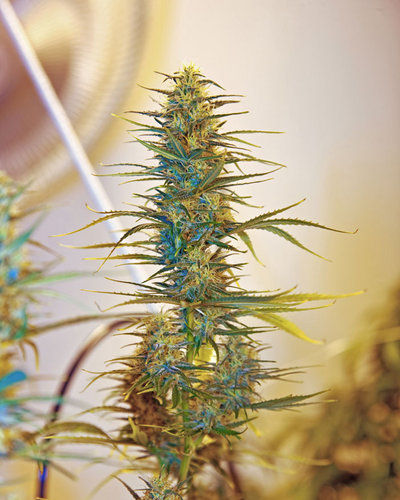Boulder Creek Collective owner Marc Whitehill is creating a storefront where local cannabis growers can make a living by serving the medical needs of the community.
“There are a lot of marijuana growers in Boulder Creek. Right now, most of that money goes into the black market. But this collective can make all that money clean, which is a benefit to the entire community,” said Whitehill, 47, who opened the medicinal marijuana dispensary in December.
California’s illegal marijuana market is about $14 billion annually, according to statistics from a recent state senate bill.
Whitehill argued that people who grow marijuana for legal use should have tax advantages and be treated like any other business.
“They won’t have to hide from authorities, and this money now can come out clean and get taxed,” Whitehill said. “So, basically, all of a sudden your neighbor — and it is your neighbor — who was a criminal all of a sudden gets decriminalized. And you would be shocked at some of our growers — nice, 50-year-old, middle-class-looking women that you think are home watching soap operas, bringing in the most amazing marijuana.”
The former registered nurse-turned-entrepreneur quietly opened The Boulder Creek Collective last year, offering a range of marijuana-based topical creams, cannabis edibles and plants.
“We didn’t want to shock or surprise people,” Whitehill said. “We thought if we went slow and quietly, people would take the time to see what we’re doing and how we’re doing it.”
Whitehill said the business promotes itself by offering top-grade products for reasonable prices and a caring staff.
“We serve about 130 to 150 patients with an average age range of mid-to-late-40s,” Whitehill said.
He touts the dispensary as a true collective — not a pot shop that’s all about profit. Local growers provide the marijuana he sells.
But the dispensary has taken some heat for its proximity to a playground and the Boulder Creek Recreation Center.
“There were some complaints by some moms, because it’s so close to where kids play, but we haven’t had any big problems. The business seems legitimate,” said Christina Horvat, manager of the Boulder Creek Recreation and Park District.
There is no signage outside the dispensary, and Whitehill said marijuana is not ingested on the premises.
Whitehill said debate about whether his collective should exist or medical marijuana should be allowed shouldn’t be up for argument.
“The law in California is that people have the right to medical marijuana,” he said. “So, whether you agree or disagree with it, it’s the law.
The use of marijuana for medical purposes has been legal in California since 1996, when voters approved Proposition 215. Last year, President Obama instructed federal law enforcers to lay off medical marijuana users and suppliers, as long as they adhere to state laws.
Still, while medicinal marijuana is legal in California, the details of how and where it can be exchanged are murky. A hodgepodge of rules governs its distribution.
In Santa Cruz County, zoning regulations do not permit marijuana distributors. Despite that, a handful of retailers operate in the Santa Cruz Mountains, including Evolution in Felton and Da-Vine Intervention in Ben Lomond, according to the directory Web site www.sanjosecannibisclubs.com.
Whitehill said state law is in his favor, and he maintains that he operates under the guidelines of voter-approved Compassionate Use Act.
Dr. Robert Webb, co-author of “Dying to Get High,” a book that promotes the idea that medical marijuana can be distributed safely and ethically, also said legality shouldn’t be in question.
“We’ve got to stop demonizing the plant,” said Webb, a Scotts Valley resident. “It should be between the patient and physician. There are people that are just so sick, and if smoking a joint helps them feel better, who is anyone to stop it?”
The active compounds in marijuana have proven effective to treat conditions such as nerve pain associated with HIV, muscle spasms associated with multiple sclerosis and other pain-related medical conditions, according to state-funded studies by the Center for Medicinal Cannabis Research.
Whitehill said those findings alone are promising, and it’s a good thing for people to replace opiates, such as Vicodin and Valium, with cannabis.
In addition to providing those in need with medicine, Whitehill said, his dispensary has cleaned up the area around the center, which was known as a drug-dealing site where people openly smoked pot outside a nearby coffee shop.
“Since we moved in, that’s not happening, and the reason is because it’s clean,” he said. “And that, to me, is the meat of the debate.”













